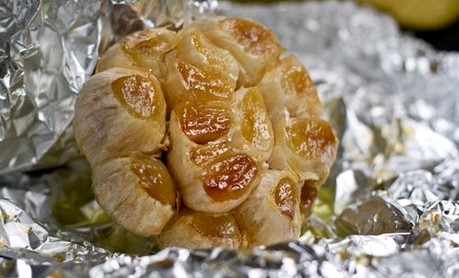All hail king garlic
April 22, 2015 by Darcie
Most cooks today wouldn’t want to be caught without garlic in their pantry. But for decades, the “stinking rose” was persona non grata, at least in much of the UK. The Guardian looks at the changes that restored garlic’s place among the pantheon of flavorings in British kitchens.
For a time in the Victorian era when French food was seen as the height of sophistication, garlic was popular. But after the Second World War, it fell out of favour, which food historian Ivan Day attributes to garlic being “seen as ‘foreign muck’ by the generation of men and women living off bully beef and reconstituted egg.” Says Day, “they got a taste for simplicity.”
There is nary a mention of garlic in most British cookbooks of the 1950s, and it wasn’t until a decade later that hints of it starting showing up in restaurants. Garlic’s climb to back to the top of the culinary ladder was a long slog through the 1970s and 80s, when Natasha Edwards’ family started a garlic farm on the Isle of Wight. “We started the farm when garlic wasn’t that popular,” she recalls. “None of my friends knew what it was and those who did thought it was foreign and gave you bad breath.”
Garlic’s come a long way since then. Fergus Henderson notes while people used to complain about smelling like garlic, “now, the musk of garlic on the breath is the musk of a good lunch.”
Photo of Roasted garlic from The Oh She Glows Cookbook by
Categories
- All Posts (6940)
- Antipasto (2135)
- Author Articles (247)
- Book News (935)
- Cookbook Giveaways (983)
- Cookbook Lovers (257)
- Cooking Tips (109)
- Culinary News (299)
- Food Biz People (552)
- Food Online (791)
- Holidays & Celebrations (272)
- New Cookbooks (149)
- Recipes (1500)
- Shelf Life With Susie (231)
- What's New on EYB (133)
Archives
Latest Comments
- Atroyer7 on Danube Cookbook Review and Giveaway
- demomcook on What foods do you look forward to the most for each season?
- demomcook on Danube Cookbook Review and Giveaway
- Darcie on How cookbooks can help build resilience
- mholson3 on Danube Cookbook Review and Giveaway
- Rinshin on How cookbooks can help build resilience
- sarahawker on Danube Cookbook Review and Giveaway
- Sand9 on Danube Cookbook Review and Giveaway
- hankintoby29 on Heritage Cookies of the Mediterranean World – Cookbook Giveaway
- WBB613 on Feasts of Good Fortune Cookbook Giveaway